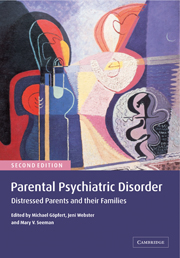Book contents
- Frontmatter
- Contents
- List of contributors
- Foreword
- Preface
- Part I Basic issues
- Part II Comprehensive assessment and treatment
- 6 ‘The same as they treat everybody else’
- 7 Formulation and assessment of parenting
- 8 Mentally ill mothers in the parenting role: clinical management and treatment
- 9 Perinatal mental illness: nature/nurture
- 10 Assessment and treatment issues when parents have personality disorders
- Part III Specific disorders: the impact on parent–child relationships
- Part IV Specific treatments and service needs
- Part V Child-sensitive therapeutic interventions
- Part VI Models for collaborative services and staff training
- Afterword
- Index
- References
6 - ‘The same as they treat everybody else’
from Part II - Comprehensive assessment and treatment
Published online by Cambridge University Press: 09 August 2009
- Frontmatter
- Contents
- List of contributors
- Foreword
- Preface
- Part I Basic issues
- Part II Comprehensive assessment and treatment
- 6 ‘The same as they treat everybody else’
- 7 Formulation and assessment of parenting
- 8 Mentally ill mothers in the parenting role: clinical management and treatment
- 9 Perinatal mental illness: nature/nurture
- 10 Assessment and treatment issues when parents have personality disorders
- Part III Specific disorders: the impact on parent–child relationships
- Part IV Specific treatments and service needs
- Part V Child-sensitive therapeutic interventions
- Part VI Models for collaborative services and staff training
- Afterword
- Index
- References
Summary
With: Getting There Together Group, Upper Fern Tree Gully, Victoria, Australia Parent Support Group, Women's Clinic, Centre for Addiction and Mental Health, Toronto, Canada
Getting There Group, Croydon, Victoria, Australia
Parent Support Group, Employment Options Inc., Marlboro, Massachusetts, USA
Parents want professionals to treat them ‘the same as everybody else’. They want professionals to see them as parents before they see them as patients, and for services to acknowledge their family relationships and responsibilities, and credit them with the capacity to act in their children's best interests. They want to be treated with dignity.
The 19 parents who contributed to this chapter come from four parent groups in Australia, Canada and the USA. They were approached through the coordinators of the parent groups listed above, and asked to respond to the questions: ‘How do you want services to respond to your needs as parent? How do you want them to respond to the issues that affect your families and children?’
This chapter coordinates their responses, often reproduced verbatim. Having agreed to participate, each group met for 1.5 hours, and their responses are summarized by the main author of this chapter (VC). Their comments highlight the impact of legislation, access to public housing, service provision for the mentally ill and the ways that states intervene in the welfare of children. They also reflect very different experiences of interventions, often painful, such as having their children removed from their care.
Parents have written personal accounts about their experiences of mental illness previously as consumers of mental health services and as parents (Aridas & ‘Christine’, 1999; Kelly, 1999).
- Type
- Chapter
- Information
- Parental Psychiatric DisorderDistressed Parents and their Families, pp. 87 - 92Publisher: Cambridge University PressPrint publication year: 2004

